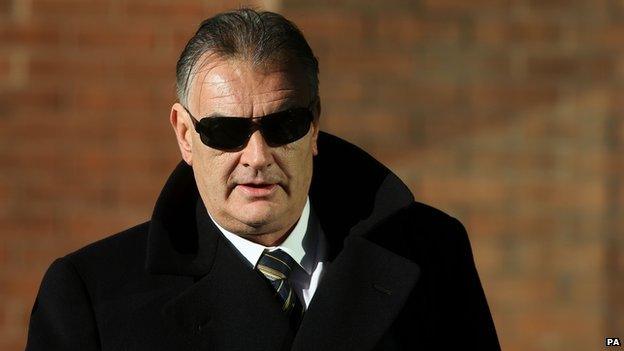Ian Bailey: Court hears police made death threat after murder arrest
- Published

Ian Bailey arrived at the Four Courts in Dublin on Wednesday to begin a lawsuit against the state for wrongful arrest over the murder of Sophie Toscan du Plantier
A court has heard an Irish policeman made a death threat to a journalist minutes after the reporter was arrested over the murder of a French film-maker.
The alleged threat was made as former freelance journalist Ian Bailey was arrested on suspicion of killing Sophie Toscan du Plantier in Cork in 1996.
Mr Bailey, originally from Manchester, is suing the Irish state for wrongful arrest and mistreatment by police.
He was arrested twice but has always denied any involvement in the murder.
Beaten to death
Ms Toscan du Plantier was found dead outside her holiday home at Toormore, near Schull, two days before Christmas 1996.
The 39-year-old Frenchwoman had been beaten to death and, 18 years on from the attack, her killer has still not been found.
Mr Bailey, who has lived in west Cork for 23 years, was first arrested in February 1997 and again in January 1998.
He was never prosecuted over the murder, on the instructions of the Director of Public Prosecutions.
The former journalist began a lawsuit against the state on Wednesday.
'Dead in a ditch'
As the case opened at the High Court in Dublin, Mr Bailey's barrister claimed that an officer made a death threat in the back of a Garda (police) car minutes after his client's first arrest on 10 February, 1997.
"He said 'even if we don't pin this on you, you are finished in Ireland. You will be found dead in a ditch with a bullet in the back of the head'," the barrister told the jury.
He added that just four days after the murder, some police officers had decided Mr Bailey was the main suspect and set about "straight away, zoning in".
The barrister said: "Information was fed to the press on a constant basis so that everyone in the community felt under threat, everyone in the community was paranoid, everyone in the community was in fear."
As well as his claim for wrongful arrest, Mr Bailey is suing the state for false imprisonment, assault, battery, trespass of the person, intentional infliction of emotional and psychological harm, harassment and intimidation, terrorising and oppressive behaviour and a breach of his constitutional rights.
The Irish state has denied all of Mr Bailey's claims.
- Published5 March 2012
